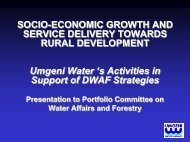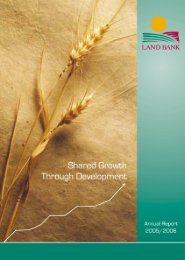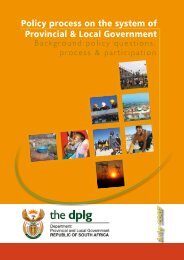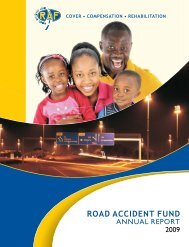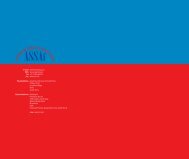Umsobomvu Youth Fund Annual Report 2006 - Nyda
Umsobomvu Youth Fund Annual Report 2006 - Nyda
Umsobomvu Youth Fund Annual Report 2006 - Nyda
Create successful ePaper yourself
Turn your PDF publications into a flip-book with our unique Google optimized e-Paper software.
On the basis of this track record, the Unit will be submitting a business plan to Cabinetto take NYS to scale to benefit more young people. Going forward, NYS will includeservice by young people who are in tertiary institutions so that they can give back totheir communities as part of the training that they are receiving.Capacity Building and ResearchThe Capacity Building and Research (CBR) Division provides strategic programmedevelopment and implementation information that guides the UYF’s youth developmentagenda. The CBR mandate includes facilitating UYF’s role as a catalyst and advocate ofbest practice in the South African youth development sector. This role comes with therealisation that UYF has to create an ideal environment in which its funded programmescan be sustained and supported beyond its direct involvement.CBR’s main functions are to regularly research and disseminate information andknowledge on the socio-economic needs; circumstances and opportunities of youththat enable the UYF’s development and implementation of relevant, effective andimpact-driven interventions, as well as to develop and implement skills developmentprogrammes for youth development practitioners. The undertaking of these functions isinformed and guided by the <strong>Umsobomvu</strong> Standards of Effective Practice (USEP) that UYFdeveloped when it was established.<strong>Youth</strong> affairs researchThe Research and Evaluation Unit located within CBR has conducted strategic researchstudies aimed at tracking and assessing the status of youth in various aspects asfollows:• As part of the UYF’s contribution to the Joint Initiative on Priority Skills (JIPSA) process,the study looked at the institutional readiness of the training facilities, including theformer Industrial Training Boards facilities (ITBs) to undertake training on critical/scarce skills on a massive scale.• The other study is looking at the Job Prospects and Sectoral Forecast. The mainobjective of the study is to assess prospects for job creation and entrepreneurshipopportunities that exist for young people in the key economic sectors. A study on theemployment and livelihood potential of co-operatives was conducted in 2003. Basedon the research findings, UYF in partnership with the Department of Labour, piloted acapacity-building programme for eight co-operatives.• A study on the status of youth in the country was done with the Human SciencesResearch Council (HSRC) in 2004. This study looked at the current economic and socialstatus of youth, but also reviewed policy and programmatic developments which havetaken place over the last ten years of democracy.• <strong>Youth</strong> development indicators were developed for a statistical analysis of the economicstatus of young people in all nine provinces and all district municipalities. Data wasdrawn from the Census 2001 in determining the economic status and participation ofyouth in district municipalities, while provincial data was drawn from the Labour ForceSurveys of September 2001 and 2004.• A study on <strong>Youth</strong> in Conflict with the Law was undertaken between the Departmentof Social Development and the UYF Research Unit. The study seeks to understand thesocio-economic status of youth who have come into conflict with the law, as well asto understand the programmes that are being implemented by Government and civilsociety in the rehabilitation of young offenders and the diversion of vulnerable youth.The above studies directed UYF in terms of its programme conceptualisation andimplementation, and have been shared with others in the related fields of interest.Monitoring and EvaluationAll UYF projects get regularly monitored and evaluated at the end of a fundingcycle. In this regard, the UYF Research Unit has been assisting the UYF’s programmeevaluations. Evaluations have been conducted on the Micro Finance Project, the CooperativesProgramme and the <strong>Youth</strong> Advisory Centres. Other evaluations that havebeen facilitated are the School-to-Work projects and Entrepreneurship Education. Thefindings thereof are used to improve thestructure and content of UYF programmesand products.Lobby and Advocacy• In partnership with three <strong>Youth</strong>Development Organisations a policysubmission was made during thereview of the National Small BusinessDevelopment and Support Strategy.The <strong>Youth</strong> Enterprise Strategy policysubmission was submitted to theDepartment of Trade and Industry andis currently being shared with the publicfor comments.• Together with the South African <strong>Youth</strong>Chamber of Commerce and NAFCOC<strong>Youth</strong>, UYF is undertaking an initiative,2010 Campaign, which seeks topromote entrepreneurial activity amongyouth and to lobby for the creation andaccessibility of business opportunitiesfor young people in South Africa.• Together with Umalusi ETQA, UYF isinvestigating an introduction of a FET(Matric) Certificate for out-of-schoolyouth. This will enable young people topursue and obtain academic recognitionoutside the formal schooling system.Knowledge ManagementAs a learning organisation, UYF is keen tolearn from its experience of implementing<strong>Youth</strong> Development Programmes. TheKnowledge Management Programme ofUYF is in its early stages; to date exercisesthat have been undertaken include:• Evaluations of the Request for Proposalmechanism issued by UYF. Theseenabled UYF to regularly improve itspresentation of such requests.• Special Edition of <strong>Youth</strong> DevelopmentNetwork Journal was published inApril 2005. This special edition journalsought to capture and document thelessons of UYF programme formulationin the past three years.• The First Knowledge Network seminaron vulnerable groups is to be held inApril <strong>2006</strong>. This will attract researchersand practitioners working with andinforming youth development practicein the country.• The First Knowledge Managementnewsletter and journal will be publishedin June <strong>2006</strong>.• A youth development resource centrehas been established and is accessibleto the public.<strong>Umsobomvu</strong> <strong>Youth</strong> <strong>Fund</strong> <strong>2006</strong> <strong>Annual</strong> <strong>Report</strong>23



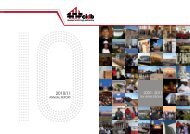
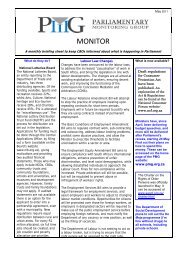
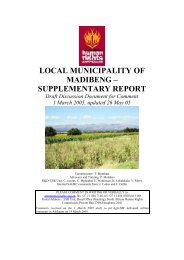
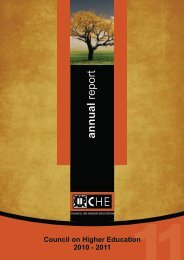
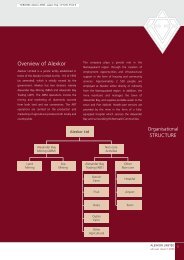
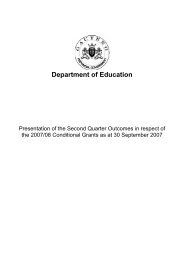
![National Research Foundation Annual Report 2008 / 2009 [Part 2]](https://img.yumpu.com/49774036/1/177x260/national-research-foundation-annual-report-2008-2009-part-2.jpg?quality=85)
